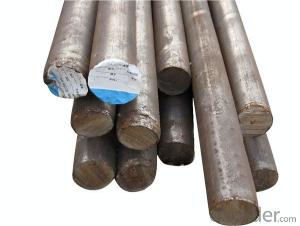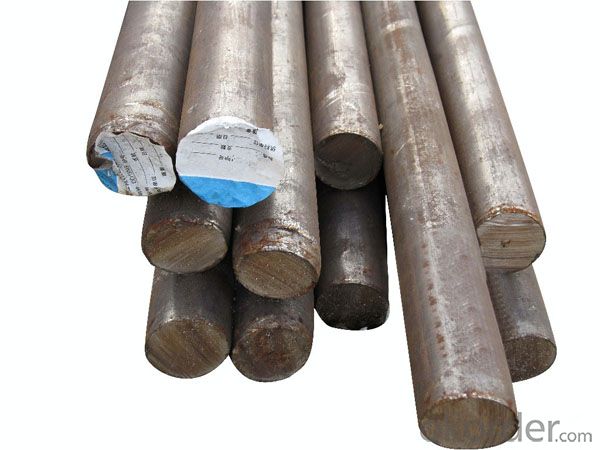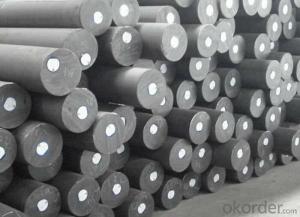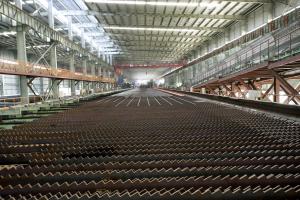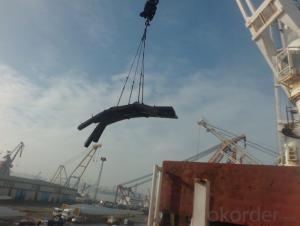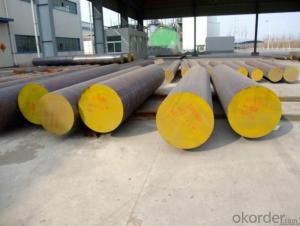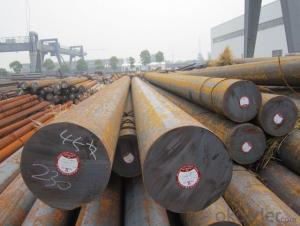Hot Rolled Carbon Steel Round Bar AISI1020
- Loading Port:
- China main port
- Payment Terms:
- TT OR LC
- Min Order Qty:
- 30 m.t.
- Supply Capability:
- 10000 m.t./month
OKorder Service Pledge
OKorder Financial Service
You Might Also Like
Specification
Hot Rolled Carbon Steel Round Bar AISI1020
Product Information:
Specifications
hot rolled carbon steel round bar
Dia 18-230mm
Grade 20,45#
Standard GB,JIS,ASTM,DIN,AISI,BS
LF & VD forge;ISO&TUV appro
Diameter: 10mm-300mm
Length: 3000mm-12000mm Straightness: 3mm/M max
Product Overviews:
| Product Name | Typical Grades | Diameter(mm) | Standard adopted |
| Carbon Steel | 20 (1020/S20C/C22) | Ø16-Ø300 | GB/SAE/JIS/DIN |
| 40 (1040/S40C/C40) | |||
| 45 (1045/S45C/C45) | |||
| Bearing Steel | GCr9 (51100/SUJ1) | Ø12-Ø250 | |
| GCr15 (52100/SUJ2/100Gr6) | |||
| GCr9SiMn (A485-Gr.1/SUJ3) | |||
| Cr-Mo Steel | 20Cr (5120/SCr420H/20Cr4) | Ø12-Ø250 | |
| 40Cr (5140/SCr440/41Cr4) | |||
| 42CrMo(4140/SCM440/42CrMo4) | |||
| Gear Steel | 20CrNiMo | Ø16-Ø600 | |
| 20CrMn(5115/SMnC420/20MnCr5) | |||
| 20CrNiMo(8620/SNCM220/20CrMiMo2) |
Product Show:

Our Advantages:
· Industry experience over 20 years.
· Shipment of goods -More than 70 countries worldwide.
· The most convenient transport and prompt delivery.
· Competitive price with best service.
· High technical production line with top quality products.
· High reputation based on best quality products.
With our experienced, enthusiastic and dynamic staffs, we assure to bring you the products with best quality, reasonable prices and good after-sales services under the motto: Friends First, Business After.
Communication, Experience, Expertise and Best efforts are our Promises to you.
- Q: What are the different case hardening grades of special steel?
- There are several different case hardening grades of special steel, including but not limited to, 1018, 1020, 8620, and 9310. These grades are specifically formulated to provide increased strength and wear resistance by creating a hardened outer layer, or case, while maintaining a softer, more ductile core.
- Q: What are the factors that affect the corrosion resistance of special steel?
- There are several factors that affect the corrosion resistance of special steel. These factors include the composition of the steel, the presence of alloying elements such as chromium or nickel, the surface finish, the pH and temperature of the environment, the presence of corrosive agents such as acids or salts, and the duration of exposure to corrosive conditions. Additionally, factors such as the design and construction of the structure using the special steel can also impact its corrosion resistance.
- Q: How does special steel perform in extreme temperature conditions?
- Special steel is designed to perform exceptionally well in extreme temperature conditions. It has enhanced heat resistance and can withstand high temperatures without losing its strength or structural integrity. Additionally, special steel exhibits excellent thermal conductivity, allowing it to efficiently transfer heat away from critical components. Overall, special steel is highly reliable and durable in extreme temperature environments.
- Q: What are the requirements for special steel used in railway applications?
- Due to the demanding nature of the industry, the railway sector has stringent requirements for the special steel it uses. Here are a few key considerations: 1. Strength and durability are of utmost importance. The steel must possess exceptional strength and durability to withstand the heavy loads and constant vibrations experienced by trains. This is crucial in preventing deformation, fatigue, and failure of steel components. 2. Wear resistance is another vital requirement. The constant movement of trains subjects railway tracks and other components to significant wear and tear. Therefore, the special steel used in railway applications should have good wear resistance. This ensures a longer service life and reduces maintenance costs. 3. Corrosion resistance is imperative due to exposure to various environmental conditions, such as rain, snow, and chemicals. The special steel must possess high corrosion resistance to prevent rusting and degradation. This ensures the longevity of the components. 4. Fatigue resistance is crucial since trains undergo repetitive loading cycles that can lead to fatigue in steel components. Special steel with excellent fatigue resistance is necessary to prevent cracking and failure. This ensures the safety and reliability of railway systems. 5. High impact toughness is essential. Special steel used in railway applications must absorb energy during sudden shocks or accidents. This prevents catastrophic failures and ensures the safety of passengers and railway personnel. 6. Heat resistance is a requirement for certain railway applications, especially high-speed trains. The steel components are exposed to high temperatures due to friction or other sources. Special steel should possess good heat resistance to maintain its mechanical properties and structural integrity even under elevated temperatures. 7. Dimensional stability is crucial to maintain the required tolerances and alignment of various components in railway applications. Special steel should exhibit excellent dimensional stability. This ensures smooth operation, reduces noise, and prevents excessive wear. These are the primary requirements for special steel used in railway applications. Meeting these requirements is crucial for the safe, reliable, and efficient operation of railway systems.
- Q: How is bearing steel used in the manufacturing of bearings?
- Bearing steel is a specialized type of steel that is used in the manufacturing of bearings to ensure high performance and durability. It is specifically designed to have excellent hardness, wear resistance, and fatigue strength. Bearing steel is used to produce the inner and outer rings, as well as the rolling elements and cages of bearings. By using bearing steel, manufacturers can produce bearings that can withstand heavy loads, high speeds, and continuous rotation, ensuring smooth operation and longer lifespan of the bearings.
- Q: What are the different manufacturing processes used for special steel?
- There are several different manufacturing processes used for special steel, depending on the specific requirements and properties desired for the final product. Some of the commonly used manufacturing processes for special steel include: 1. Electric Arc Furnace (EAF): This process involves melting scrap metal in an electric arc furnace, where high electrical current passes through the electrodes to melt the metal. EAF is commonly used for producing stainless steel, tool steel, and alloy steel. 2. Basic Oxygen Furnace (BOF): BOF is a process where molten iron from a blast furnace is combined with scrap metal and oxygen is blown through the mixture to remove impurities. BOF is widely used for producing carbon and low-alloy steels. 3. Vacuum Degassing: This process is used to remove impurities like hydrogen, nitrogen, and sulfur from steel by subjecting it to a vacuum environment. Vacuum degassing is often employed for producing high-quality and ultra-clean special steels. 4. Continuous Casting: In this process, molten steel is poured into a water-cooled mold, where it solidifies into a continuous strand. Continuous casting helps to produce steel with a consistent shape, size, and internal structure, and is commonly used for semi-finished products like billets, slabs, and blooms. 5. Powder Metallurgy: This manufacturing process involves compacting metal powders into the desired shape and then sintering them at high temperatures to bond the particles together. Powder metallurgy is often used for producing special steels with specific properties, such as high strength, wear resistance, or corrosion resistance. 6. Heat Treatment: Heat treatment processes like annealing, quenching, and tempering are commonly employed to modify the microstructure and properties of special steels. These processes involve heating the steel to specific temperatures and then cooling it in a controlled manner to achieve desired hardness, toughness, and other mechanical properties. Each of these manufacturing processes has its own advantages and limitations, and the choice of process depends on factors such as the type of steel required, the desired properties, and the cost-effectiveness of the process for a particular application.
- Q: Can special steel be used in the jewelry industry?
- Yes, special steel can be used in the jewelry industry. It is often used as an alternative to precious metals like gold or silver due to its durability and affordability. Special steel can be used to create unique and stylish jewelry pieces, such as rings, bracelets, and necklaces, that are resistant to tarnish and wear.
- Q: Can special steel be used in the production of turbine blades?
- Yes, special steel can be used in the production of turbine blades. Special steel, such as superalloys, offers excellent high-temperature strength, corrosion resistance, and fatigue resistance, making it ideal for turbine blade applications where these properties are crucial for optimal performance and durability.
- Q: What are the different methods of surface tumbling for special steel?
- Special steel can be surface tumbled using various methods, including barrel tumbling, vibratory tumbling, and centrifugal tumbling. To achieve a smooth and polished surface finish, barrel tumbling is commonly employed. This method involves placing the steel parts in a rotating barrel with abrasive media. As the barrel rotates, the steel parts tumble and come into contact with the abrasive media, effectively eliminating burrs, sharp edges, and surface imperfections. Vibratory tumbling, on the other hand, utilizes a vibrating container for surface tumbling special steel. The steel parts are placed in this container along with abrasive media. The vibration causes the steel parts to move and interact with the abrasive media, resulting in the removal of surface imperfections. Vibratory tumbling is often chosen for delicate or complex-shaped steel parts due to its gentler action compared to barrel tumbling. For precise control over the tumbling process, centrifugal tumbling is a specialized method that employs centrifugal force. Steel parts are positioned inside a rotating drum, which is then spun at high speed. The centrifugal force propels the steel parts to move and come into contact with the abrasive media, resulting in the elimination of surface imperfections. Centrifugal tumbling is particularly suitable for smaller or intricate steel parts. In summary, these different methods of surface tumbling offer diverse options for achieving the desired surface finish for special steel. The selection of a method depends on factors such as the size, shape, and delicacy of the steel parts, as well as the desired level of surface finish.
- Q: What are the limitations of using special steel in marine environments?
- Special steel, while highly durable and resistant to corrosion, does have its limitations when used in marine environments. One of the main limitations is its susceptibility to pitting corrosion. Due to the presence of chloride ions in seawater, special steel can develop localized corrosion known as pitting, which can weaken the material and compromise its structural integrity. Furthermore, special steel may also be prone to stress corrosion cracking in marine environments. When exposed to tensile stress and corrosive agents, such as saltwater, the material can develop small cracks that propagate over time, leading to catastrophic failures. This makes it crucial to carefully monitor and manage the stress levels to prevent such occurrences. Additionally, special steel can be affected by galvanic corrosion when in contact with different metals or alloys in a marine environment. This occurs due to the electrochemical potential difference between the metals, resulting in accelerated corrosion of the less noble material. This requires careful consideration when selecting other materials for use in conjunction with special steel to avoid galvanic corrosion. Moreover, the cost of special steel can be significantly higher compared to other materials used in marine environments. This can pose a limitation, especially for projects with budget constraints. The higher costs of special steel may make it less financially viable for certain applications, leading to the exploration of alternative materials for marine applications. Lastly, the weight of special steel can also pose limitations in marine environments. Its density can contribute to increased weight, which affects the buoyancy and overall stability of marine vessels. This can impact the performance and maneuverability of ships and offshore structures, necessitating careful engineering and design considerations. In conclusion, while special steel offers excellent durability and corrosion resistance, it does have limitations when used in marine environments. Pitting corrosion, stress corrosion cracking, galvanic corrosion, higher costs, and weight considerations are some of the factors that need to be carefully managed and accounted for when utilizing special steel in marine applications.
Send your message to us
Hot Rolled Carbon Steel Round Bar AISI1020
- Loading Port:
- China main port
- Payment Terms:
- TT OR LC
- Min Order Qty:
- 30 m.t.
- Supply Capability:
- 10000 m.t./month
OKorder Service Pledge
OKorder Financial Service
Similar products
Hot products
Hot Searches
Related keywords
